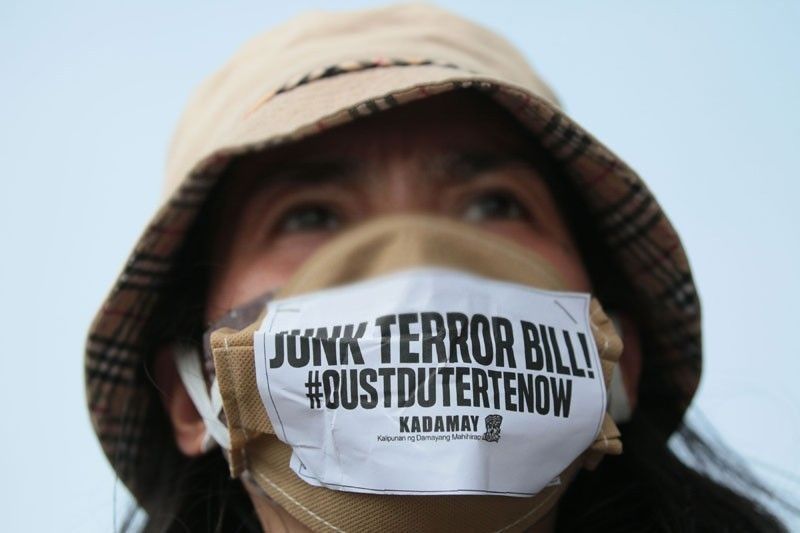IRR of anti-terror law released

MANILA, Philippines — The Anti-Terror Council (ATC) published on Friday night the implementing rules and regulations (IRR) of the Anti-Terror Act of 2020, which emphasized that speeches, proclamations, writings, emblems and banners, among others, could be considered as forms of inciting to commit terrorism.
In the 48-page IRR, inciting to commit terrorism is defined as an act of an individual who does not directly take part in the commission of terrorism, but incites others to commit terroristic activities as defined in Section 4 of the law.
“There is incitement to commit terrorism… when a person who does not take any direct part in the commission of terrorism incites others to the commission of the same in whatever form by means of speeches, proclamations, writings, emblems, banners or other representation,” the IRR stated.
The IRR also emphasized that incitement to commit terrorism is present when it “is done under circumstances that show reasonable probability of success in inciting the commission of terrorism.”
But it emphasized that the context, speaker or the actor, intent, content and form, extent of the speech or act and the causation should be considered in determining the existence of reasonable probability of speeches, proclamations, writings, emblems, banners and the like.
It stated that violators of the provision of the law will be penalized with imprisonment of 12 years.
As part of the so-called “safety net” of the law, the IRR clarified that advocacy, protest, dissent, stoppage of work, industrial or mass action, creative, artistic and cultural expression or other similar exercises of civil and political rights are not considered terrorism.
But the IRR stated that any exercises of civil and political rights intended to cause death or serious physical harm to anybody, to endanger a person’s life or to create serious risk to public safety are punishable for the crime of terrorism.
“The burden of proving such intent lies with the prosecution arm of the government,” the IRR stated.
“Any person found guilty of committing terrorism as defined in Section 4 of the Act shall suffer the penalty of life imprisonment without benefit of parole and the benefits of Republic Act No. 10592 (the Expanded Good Conduct Time Allowance Law),” it added.
Under Rule V, the IRR said that a law enforcement agent or military personnel may “secretly wiretap, overhear and listen to, intercept, screen, read, surveil and record or collect any private communications, conversation, discussion, among others, upon order of the Court of Appeal (CA).
The IRR emphasized that surveillance, interception and recording of private communications between lawyers and their clients, doctors and patients, journalists and their sources and confidential business correspondence are prohibited.
Groups and individuals may also be declared as terrorists as stated under the IRR if they violated certain provisions of the law and those who will be identified by the National Intelligence Coordinating Agency (NICA).
Justice Undersecretary Adrian Sugay said that they have already done the “proscription” with regard to the CPP-NPA and filed it under the Human Security Act, which is currently pending before the Manila regional trial court.
Sugay, meanwhile, emphasized that law enforcement agents must comply with the sworn statement requirement of the anti-terror law as far as detention without warrant of arrest is concerned as stated under Rule IX of the IRR.
“Otherwise, they may end up violating Article 125 of the Revised Penal Code for Delay in the Delivery of Detained Persons or the penal provisions of the ATA,” Sugay told reporters in a Viber message yesterday.
The Anti-Terror Act of 2020 is facing at least 37 petitions filed by various groups including lawyers, lawmakers and human rights advocates, among others, before the Supreme Court (SC), questioning its constitutionality.
Sugay said the IRR was crafted taking into consideration the petitions filed before the SC. The SC has yet to schedule oral arguments of the petitions filed before the tribunal.
- Latest
- Trending






























